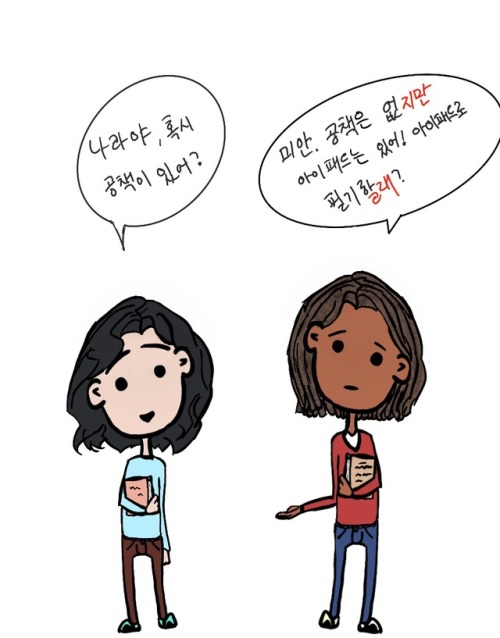Today, I have two beginner grammar points! A/V지만 and V(으)ㄹ래. They are quite simple, but this post en
Today, I have two beginner grammar points! A/V지만 and V(으)ㄹ래. They are quite simple, but this post ended up being much longer than I thought it would. 지만 is a way to express opposing situations or “but.” It’s simple and to the point.Luckily verbs and adjectives are conjugated the same way with 지만.Present tense: All you have to do is remove the dictionary 다 from the verb/adjective and add 지만.좋아하다너를 좋아하지만 우리는 사귈 수 없어. I like you, but we can’t date.먹다저는 야채를 잘 먹지만 과일을 잘 안 먹어요. I eat vegetables well (often, a lot), but I don’t eat fruit well (often, a lot).좋다이 신발이 좋지만 너무 비싸요. These shoes are good, but they’re too expensive.나쁘다그 남자는 성격이 나쁘지만 잘 생겼어요. That guy’s personality is bad, but he’s handsome.And, it can be used with nouns as well in the form of (이)지만.Nouns that end in a consonant get followed by 이지만 (ex: 선생님이지만), and nouns that end in a vowel get followed by 지만 (ex: 실례지만).저는 선생님이지만 어렸을 때 학교 가기 싫었어요. I’m a teacher, but I hated going to school when I was young.그 사람은 우리 오빠지만 우리는 안 닮았어요. That person is my older brother, but we don’t look alike.저는 학생이 아니지만 어려 보여서 학생 할인을 받았어요. I’m not a student, but I got the student discount because I look young.지만 can also be used with the past tense. All you do is add 지만 to the past 았/었/였.좋아했지만 // 먹었지만 // 좋았지만 // 나빴지만 // 학생이었지만 // 오빠였지만It can be used with other grammatical constructions as well, but I’ll leave them out to keep this beginner.———————————————————————————————————V(으)ㄹ래 is also a rather simple grammar point. When I learned (으)ㄹ래, the book taught it as another future tense “will.” And because of that, I confused it with the other future tenses like (으)ㄹ 거예요 and (으)ㄹ게요. But, luckily they are all quite different from each other in usage. V(으)ㄹ래요 is used when someones will or want is involved. It’s a very strong way to say “I will” do something or “want to” do something.For example:A 집에 가서 공부 할 거예요. I will go home and study.B 집에 가서 공부할래요. I will go home and study.These two sentences are actually very different. The first sentence (A) just states that you’re going to go home and study, it doesn’t necessarily mean that you want to study at home. It’s just something that will happen. But the second sentence (B) means that this is what you want to do. You want to study at home. It can emphasize that you want to do the action (studying), or it can emphasize that you want to do the action specifically at your house. And probably not where you are now.Let’s look at another example.A 나랑 같이 갈 거야? Are you going with me?B 나랑 같이 갈래? Will you go with me? (Want to go with me?)These are also very different. Sentence A can be used to ask for information. “Are you going with me?…or with someone else? or…?” But sentence B asks about that persons will. “Will you go with me?/Do you want to go with me?”Let’s look at some more examples of (으)ㄹ래.으으…소개팅 하기 싫어. 안 갈래. uhh…I don’t want to have a blind date. I’m not going./I won’t go.여기 좀 시끄러워서 도서관에 가서 공부할래요. This place is a bit loud, so I’ll go to the library and study. 뭐를 먹을래(요)? What do you want to eat? (informal) 뭐를 드실래요? What do you want to eat? (Formal/respectful)난 절대 결혼하지 않을래. I will never get married. 너가 가. 난 여기 있을래. You go. I’ll stay here. (I want to stay here./I’m going to stay here.)note: (으)ㄹ게 also means “I will,” but it’s mostly used when making promises or saying “I will” do something for someone else (favors, promises etc). A: 문닫아야 겠어. 추워. I better shut the window. It’s cold.B: 앗 내가 닫아 줄게. Ah, I’ll shut it (for you).If I say, 내가 닫을래/닫아 줄래 (I will shut it/I will shut it for you), it sounds like I’m saying “Don’t close it, I want to be the one to close it!” In that sense (으)ㄹ래 is the strongest “will” among the three. To organize it quickly in a simple guide for beginners:(으)ㄹ 거야/거예요 - general information about the probable future(으)ㄹ게(요) - will do something for someone else(으)ㄹ래(요) - will do something because I want to do itThis might be more confusing than it should be. So, please leave any messages if something needs clarification. And, I good luck studying everyone!I hope you all had a good weekend! Follow me if you want to keep seeing more Korean posts.^^ -- source link
Tumblr Blog : milkcocoahkorean.tumblr.com
#korean#learn korean#study korean#한국어 배우기#한국어 공부#한국어 공부중#한국어공부#한국어공부중#한국어#한국말#한국어 문법#문법#korean language#korean grammar#milkcocoah korean#kdrama

